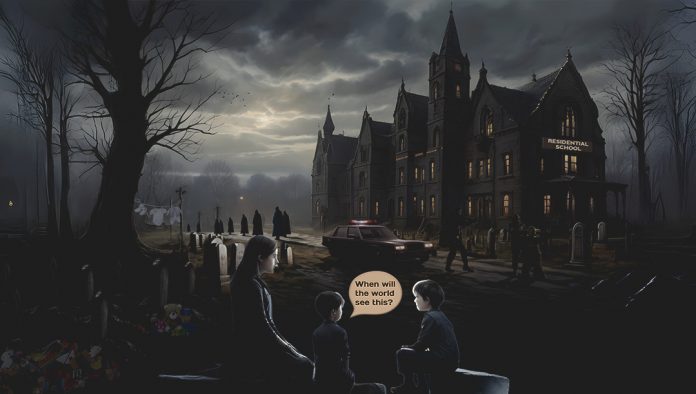Canada’s history has hidden chapters.
On the fourth National Day for Truth and Reconciliation, a profound question emerges: to what extent does the world truly grasp the depth and impact of Canada’s concealed past?
As someone new to Canada, I was amazed to learn about the rich Indigenous cultures and their deep-rooted history. Last year around the same time—September 26—during our class, we had the opportunity to interview Priscilla Wolf, a reporter at Aboriginal Peoples Television Network (APTN) and that’s when I was introduced to Indigenous cultures. It was like discovering a hidden world, one that had always been there but I had never seen before.
The more I delved into the situation of Indigenous peoples and how they have been treated, the more I realized the importance of sharing these stories globally. Sept. 30 isn’t just for Canada, it’s a worldwide reminder that there is a need to build a society where all cultures are respected and can live together peacefully.
Indigenous peoples in Canada have endured centuries of systemic oppression, with residential schools leaving deep scars on generations. These institutions were meant to assimilate Indigenous children. Instead, they tore families apart and inflicted lasting trauma. These children faced substandard education, harsh punishments for speaking their languages, and widespread physical and sexual abuse.
For over 150 years, from the 1830s until the last residential school closed in 1996, First Nations, Inuit, and Métis children were forcibly separated from their families. This systematic separation was made possible through various government policies, most notably the Indian Act of 1876, which with various amendments is still in effect.
The discovery of unmarked graves near the former sites of seven Canadian Indian residential schools in the Northwest Territories as well as in the provinces of Manitoba, British Columbia, and Saskatchewan in recent years has brought this painful history into sharp focus.
The Truth and Reconciliation Commission’s findings are chilling, over 4,000 documented deaths of Indigenous children in residential schools, with estimates suggesting the true toll could exceed 6,000. These numbers represent not just statistics, but countless shattered families and communities.
If these reasons aren’t compelling enough, consider this: While Indigenous people make up 6.2 per cent of the world’s population, they safeguard 80 per cent of the planet’s biodiversity. This fact alone underscores their crucial role in global environmental stewardship. Yet they were—and often still are— disregarded, disrespected and disenfranchised.
In a tragic two-week period (August 29 – September 9, 2024), six First Nations individuals lost their lives in police encounters. These incidents echo previous fatalities, highlighting an ongoing pattern of disproportionate police violence against Indigenous people.
Indigenous suffering isn’t an issue of history but a stark reality of the present. However, through education, advocacy, and collective action, we can empower Indigenous communities to reclaim their rights and shape a more just future.
As we mark the National Day for Truth and Reconciliation, let us not just remember, but act by educating ourselves. The Indigenous Histories and Reconciliation Modules provided by Durham College is a good place to begin.




